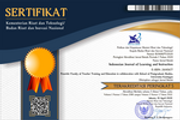LISTENING COMPREHENSION STUDY: DIFFICULTIES AND STRATEGIES USED BY COLLEGE STUDENTS
Abstract
Listening is viewed so momentous since they are central to get a language. Listeners often do not handle listening tasks in an effective way utilizing these strategies successfully. This study investigates the listening barriers as well as listening strategies used by intermediate and upper intermediate college students. The purpose of this study are determining the listening barriers faced by those intermediate and intermediate students and presenting the listening strategies used by those intermediate and upper intermediate students in order to overcome its barriers. Within the qualitative method undertaken of this research, the result has classified the listening barriers faced by intermediate, they are: (a) accents, (b) lack of concentration, (c) speed, (d) lack of vocabularies, and (e) unclear speakers’ statement. Meanwhile, the upper intermediate’s barriers are accents and lack of vocabularies. Moreover, in order to overcome the issues, those students used several strategies that mostly for both intermediate and upper intermediate levels use these strategies, such as: (a) reading, (b) focus, (c) predicting, and (d) find the keywords. The result undertakes to increase EFL learners’ consciousness of these difficult areas in listening that are suitable and effective actions. Therefore, those EFL learners will be able to adopt several strategies in terms of listening.
Keywords: listening comprehension; listening barriers; listening strategies
Full Text:
PDFReferences
Azmi, B. M., Celik, B., Yidliz, N., & Tugrul, M. C. (2014). Listening comprehension difficulties encountered by students in second language learning class. Journal of Educational and Instructional Studies in the World, 4(4), 1-6.
Bozorgian, H. & Alamdari, E. F. (2018). Multimedia listening comprehension: Metacognitive instruction or metacognitive instruction through dialogic interaction. ReCALL, 30(1), 131–152.
Bozorgian, H. (2014). The role of metacognition in the development of EFL learners’ listening skill. International Journal of Listening, 28, 1-13.
Brownell, J. (2010). Listening: Attitudes, principles, and skills (4th ed.). Boston, MA: Allyn & Bacon.
Buck, G. (2001). Assessing Listening. Cambridge: Cambridge University Press.
Creswell, J. W. (2014). Research Design Qualitative, Quantitative, and Mixed Method Approaches 2nd Edition. California: SAGE Publications.
Creswell, J. W. (2007). Qualitative Inquiry & Research Design: Choosing Among Five Approaches 2nd Edition. California: Sage Publications.
Fraenkel, J. R., Wallen, N. E., & Hyun, H. H. (2012). How to Design and Evaluate Research in Education (8th ed.). New York: McGrawHill.
Ghoneim, M. N. M. (2013). The listening comprehension strategies used by college students to cope with the aural problems in EFL classes: An analytical study. Journal English Language Teaching, 6(2). Canadian Center of Science and Education.
Gilakjani, P.A & Sabouri, B. N. (2016). Learners’ listening comprehension difficulties in English language learning: A literature review. Journal English Language Teaching, 9(6). Canadian Center of Science and Education
Goh, C. (2010). Listening as process: Learning activities for self-appraisal and self-regulation. In N. Harwood (ed.), English language teaching materials: Theory and practice. Cambridge: Cambridge University Press, 179–206.
Graham, S. (2017). Research into practice: Listening strategies in an instructed classroom setting, Language Teaching, 50(1), 107–119.
Griffiths, C. (2013). The Strategy Factor in Successful Language Learning. Bristol: Multilingual Matters.
Hamouda, A. (2013). An investigation of listening comprehension problems encountered by Saudi students in the EL listening classroom. International Journal of Academic Research in Progressive Education and Development, 2(2), 113-15.
Maftoon, P. & Alamdari, E. F. (2016). Exploring the effect of metacognitive strategy instruction on metacognitive awareness and listening performance through a process based approach, International Journal of Listening.
Namaziandost, E., Ahmadi, S., & Keshmirshekan, H. M. (2020). Listening comprehensions problems and strategies used by intermediate EFL learners. Journal of English Literature and Cultural Studies (JELCS Journal), 2(3), pp.2667-6214.
Oxford, R. L. (2011). Teaching and Researching Language Learning Strategies. Essex, UK: Pearson Longman.
Pourhosein, G. A., & Ahmadi, M. R. (2011). A study of factors affecting EFL learners’ English listening comprehension and the strategies for improvement. Journal of Language Teaching and Research, 2(5), 977-988.
Rahimirad, M. (2014). The impact of metacognitive strategy instruction on the listening performance of university students. Procedia—Social and Behavioral Sciences, 98, 1485–1491.
Rahimi, M., & Katal, M. (2012). Metacognitive listening strategies awareness in learning English as a foreign language: A comparison between university and high-school students. Procedia—Social and Behavioral Sciences, 31, 82–89.
Rossman, G. & Rallis, S. F. (2012). Learning in the Field: An Introduction to Qualitative Research (3rd ed.). Thousand Oaks, CA: Sage.
Saraswaty, R. D. (2018). Learners’ difficulties & strategies in listening comprehension. English Community Journal, 2(1), pp.139–152. Universitas Muhammadiyah Palembang.
Vandergrift, L., Cross, J. (2015). Replication research in L2 listening comprehension: A conceptual replication of Graham & Macaro (2008) and an approximate replication of Vandergrift & Tafaghodtari (2010) and Brett (1997). Language Teaching, 1-10.
Vandergrift, L., & Goh, C. M. (2012). Teaching and learning second language listening: Metacognition in action. New York, NY: Routledge.
Yeldham, M., & Gruba, P. (2014). Toward an instructional approach to developing interactive second language listening. Language Teaching Research, 18, 33–53.
DOI: https://doi.org/10.25134/ijli.v4i1.4345
Refbacks
- There are currently no refbacks.
Copyright (c) 2021 Indonesian Journal of Learning and Instruction

This work is licensed under a Creative Commons Attribution-NonCommercial-ShareAlike 4.0 International License.

